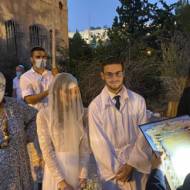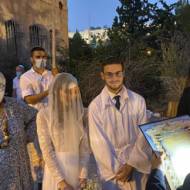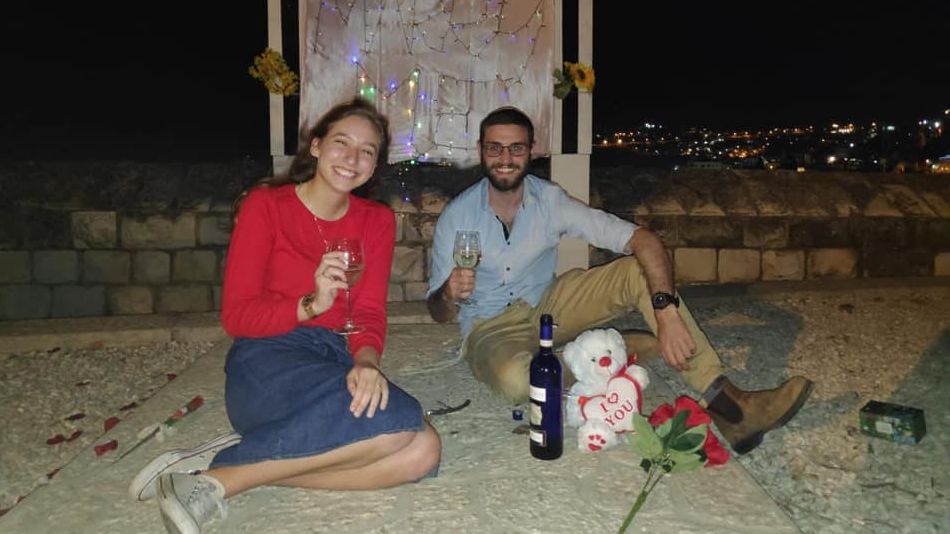
Corona Love Story: Young Couple Weds After Meeting at Lone Soldier Event

Newlyweds Shachar and Dean Unterslak raved about the help they received from The Michael Levin Base, saying they don’t know how they would have managed without it.
By Atara Beck, United with Israel
Located in the center of Jerusalem near the famous shuk, or open market, The Michael Levin Base, launched in February 2020, provides a wide range of support to lone soldiers and b’not sherut – young women who do national service. These soldiers and volunteers, most of them olim (immigrants), had left their families and friends to serve the Jewish state.
The Base was named in memory of Michael Levin, an American-Israeli IDF lone soldier who served in the Paratroopers Brigade and was killed in action at the age of 22 in the Second Lebanon War.
“We had just started, and then corona broke,” the Base’s co-director Lizzie Noach, a London native, told United with Israel. “The idea was to do social events, meals, help them with everything they need before, during and after their service, but because of corona we’ve been doing a lot of takeout meals, helping those who are just arriving and going into isolation by bringing them packages.
“A lot of kids have just finished their service and are having trouble finding jobs because all the kinds of jobs they would take are in restaurants and hotels. Since April, nobody has been hiring. So extra food for the holidays – Passover, and now Rosh Hashana…. They need that extra support. We’re not a soup kitchen, but we help with meals. We’ve had a few small events, whatever would be allowed by the Health Ministry, as well as consultation one-on-one or by phone.”
Newlyweds Dean and Shachar Unterslak met and fell in love through the Base.
Dean, 28, left Johannesburg, South Africa, for Israel eight and a half years ago. He did his gap year at a yeshiva in Gush Etzion before becoming a paratrooper in the IDF.
“It was an amazing army experience, I really loved it,” he says. “I participated in Tzuk Eitan [Operation Protective Edge in Gaza in 2014], Operation Shuvu Achim [the search for three kidnapped teens in June 2014], and afterwards made aliyah officially.”
He also volunteered with lone soldiers over the years and with other organizations, such as Hashomer Hachadash [the New Guardians], which helps farmers and ranchers protect their land.
Shachar, 21, made aliyah from Dallas, Texas, where her family still lives. After spending a year at a seminary for Torah study in Jerusalem, she joined the army last year.
“I was in a base next to Ramallah in a control room… It was a very high-intensity job,”dealing with terrorism and notifying families of attacks, she says, adding that despite the challenges, she was so happy to contribute.
How They Met
“I never thought I would marry a young American girl who spent a year in seminary and then in the army as a lone soldier,” says Dean. “I went on a hike last year during Passover, by myself, and I met up with random people along the way. I met some Israeli girls from Givat Shmuel [near Tel Aviv]. I became friendly with them, we had a good time all together, and through one of the girls I met my wife.”

Newlyweds Shachar and Dean Unterslak (Michael Levin Base)
Actually, they first met a year earlier when some friends tried to introduce them, he explains. “But it didn’t work out. This year, after the Purim holiday [in March], a good friend told me about The Michael Levin Base. He said, ‘Dean, you have to become part of this organization, you have to check it out.’
“I wasn’t so involved with lone soldiers at that point, I’d taken a break from it. So there I was, sitting at a desk – it was a Friday, they were handing out challah and wine for Shabbat – and all of a sudden Shachar walks in with a friend. She was a lone soldier then. I spoke to her, and from that moment on, things just boomed.
“[The following] Sunday was the lockdown, and for one whole month she had to stay on base. That was our first month talking to each other. I started speaking to her on Facebook and then I got her number and we started speaking on the phone, and the whole beginning of our relationship was through Whatsapp and video calls. It was completely virtual dating. After four months we got engaged.
“We couldn’t go out to coffee shops,” he continues. “I would bring a thermos with a traditional South African tea. It was freezing cold in the nights. We’d go out and sit on benches, go home with freezing toes. We were just outside all the time…
“The first time we went to a coffee shop, we were engaged.
“When it was time to get married, we both spoke to our parents, and they told us, ‘Don’t postpone the simcha [joyous occasion]…it’s not about us, it’s about you… We were very blessed to be able to move on with their emotional support.”
Canopy in Memory of Terror Victim
“We were meant to get married at Shachar’s aunt, in her garden…it was all organized…then all of a sudden we got a phone call saying that our caterer got the coronavirus and Shachar’s aunt had to go into isolation,” Dean continues. “We were originally allowed 50 people, and the restrictions now were down to 20 people. Everything was canceled… We were two weeks away from the wedding. We started from scratch…”
Shachar’s adopted family, who live in Yemin Moshe, outside the Old City of Jerusalem, helped them organize the ceremony, held at the local synagogue. They were given use of a chuppah [wedding canopy] made in memory of 17-year-old terror victim Rina Shnerb. “We were the first couple to ever use that chuppah. It was incredible, very special,” Dean says.
Shachar and Dean raved about the help they received from the Michael Levin Base, saying they don’t know how they would have managed without them.
“[Co-director] Bonnie [Rosenbaum] and Lizzie asked: ‘What do you need?’ They were literally like our mothers away from home. They would sit with us every day,” the couple says.
The Base works with several communities across the country that together provide food for lone soldiers and B’not Sherut for Shabbat and holidays. “Bonnie spoke to these communities and organized the barbecue and drinks for the wedding,” Dean says. “We told her we need salads and dessert.
“There were about 40 people at the wedding, because you could have some inside and some outside. Bonnie organized the most amazing salads and desserts made at peoples’ houses.
“Besides that, she set up our entire apartment ahead of the wedding. After the ceremony, we went to [Jerusalem neighborhood] Nachlaot and continued the celebration at an Airbnb apartment. It was incredible,” the happy groom enthuses.
The Lone Soldiers Base also organized Dean’s aufruf – where, according to Ashkenazi tradition, the groom, on the Sabbath preceding the wedding, reads from the Torah – and an evening of Sheva Brachot. (Sheva Brachot are seven blessings recited over wine during the wedding ceremony, after the wedding feast, and following festive meals during the next seven days.)
“We were the first couple that met through the base, and we have to show them hakarat hatov (gratitude) and thank them because even the emotional support they gave us was more than anything, and they did beyond. Without their support, it would have been a lot harder for us, and who knows? Maybe it wouldn’t have worked,” Dean says.
Michael Levin Base ‘Makes Such a Difference’
“And to be honest, we never would have wished for something better than this. It would have been great for our parents to be there and our siblings, but aside from that, it was so beautiful. They make such a difference for so many lone soldiers and B’not Sherut.”
Dean was working as a tour guide before the coronavirus hit, and as a result he lost his job. Asked how they manage, he quips, “I don’t know, but I found a way.”
On a more serious note, “I learned in the army to just keep on going, not to give up. Especially, loving Israel so much, I’m very happy over here. If I were anywhere else, I can’t imagine what I’d be doing during this time… The whole world is having a difficult time, but being in Israel has helped a lot. I haven’t had one depressing day, which is amazing, because this is the time to be depressed. Corona was the time when I was happiest, I met Shachar.
HELP ISRAELIS BATTLE CORONA!
Donate to the Corona Emergency Relief Fund. Coronavirus has taken a huge toll on the people of Israel. The poor, elderly and ill are most vulnerable.
Israeli soldiers, security officers and medical care providers operate under great danger and risk to life.
Over 1 million Israelis are out of work. Many cannot make ends meet. We provide financial aid, food, medical supplies and more. Funds are distributed where needed most. The time to act is now!
United with Israel